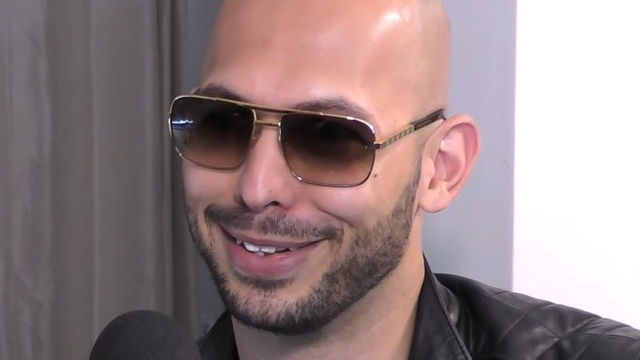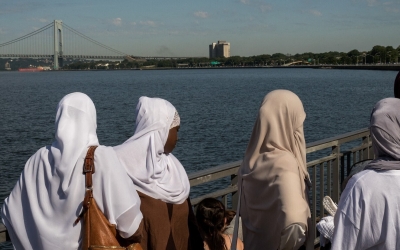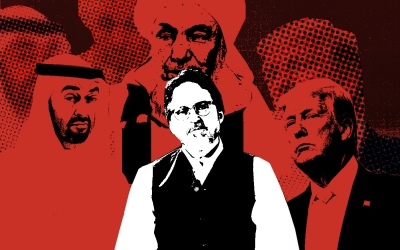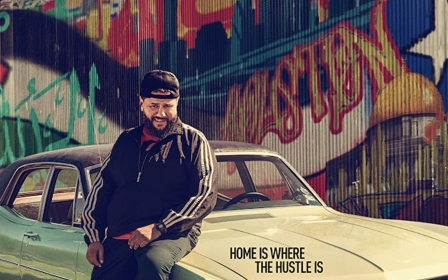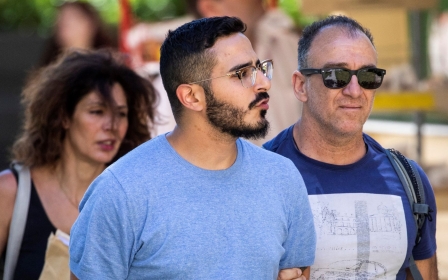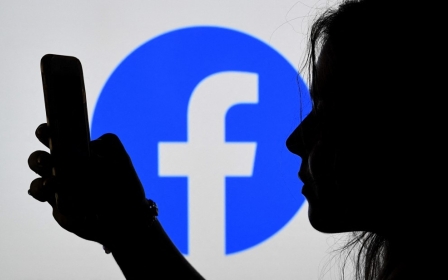Why do so many western Muslim men love Andrew Tate?
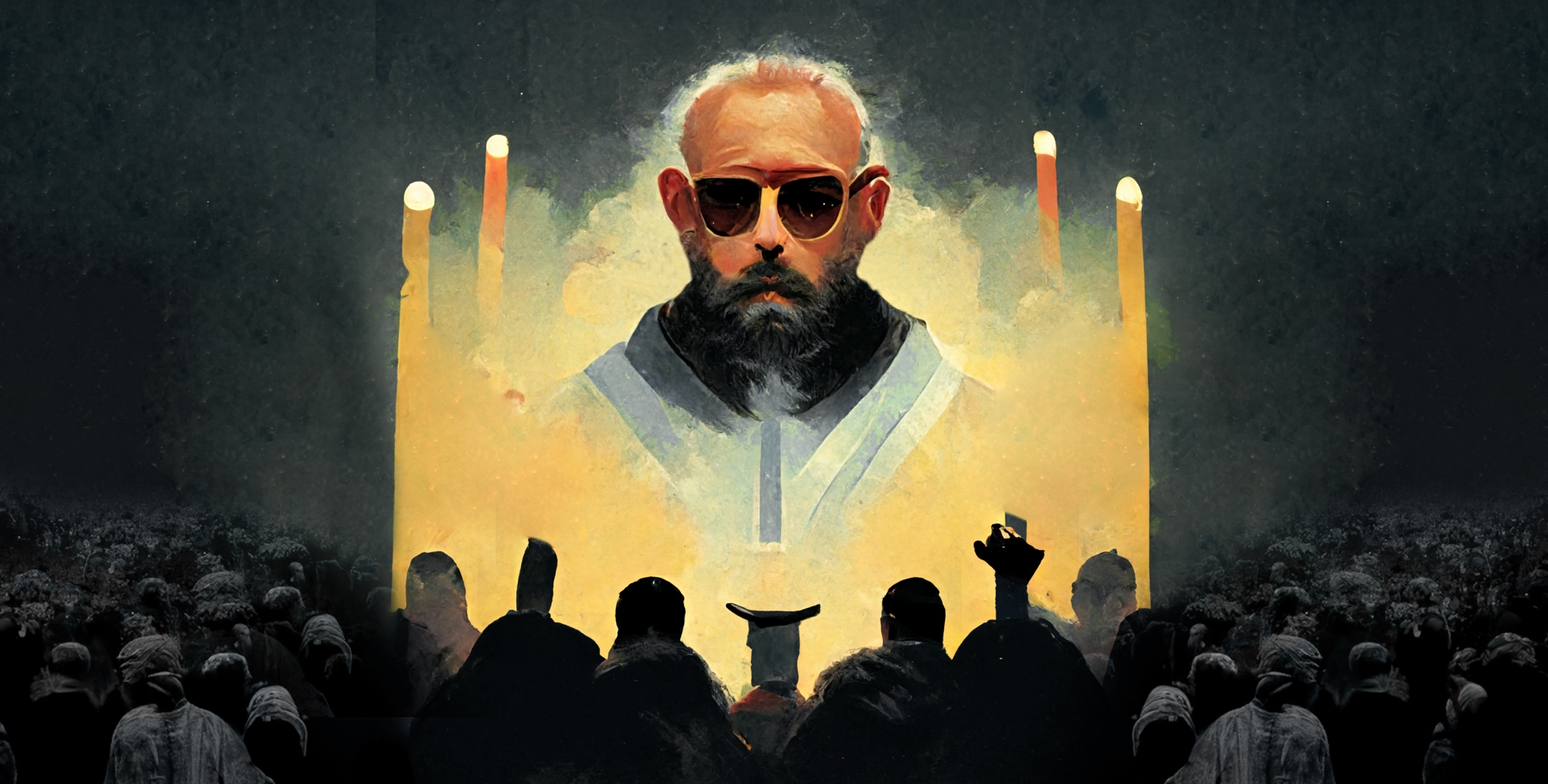
A few months ago, a TikTok video went viral. It was a “man on the street” interview where someone brings a microphone up to random people on the street and asks them questions.
Here’s how the exchange went:
“Who’s your biggest role model, would you say?”
“My biggest role model right now who’s alive?”
“Could be alive or dead.”
New MEE newsletter: Jerusalem Dispatch
Sign up to get the latest insights and analysis on Israel-Palestine, alongside Turkey Unpacked and other MEE newsletters
“I’m Muslim so I’d say Prophet Muhammad, peace be upon him, yeah?”
Later, in the comments, people argued that he should have stopped right there.
“But right now someone who does kind of inspire me, and this is quite controversial, [is] Andrew Tate.”
For many, it was a confusing answer.
Tate is, arguably, one of the most popular men on the internet right now, though not for all good reasons. The principles that were important to Prophet Muhammad are not similar to what Andrew Tate espouses. The British-American kickboxer gained infamy and widespread criticism by making violent, misogynistic comments about women on social media.
'Sure some things Andrew Tate says are controversial, but many of the things he says are Islamic'
- Huzaifa, a fan of Tate
In July, there were more Google searches for his name than for Donald Trump or Kim Kardashian, the Guardian reported.
The 35-year-old rose to fame when he started offering paid courses and memberships on marketing to his online community on Discord, aptly titled, Hustler’s University - which has been dubbed a “pyramid scheme”. The “course” was shut down last week after he was banned from several social media platforms for violating a range of policies from “dangerous organizations and individuals” to “hate speech” and “misogyny”.
The examples are endless and are a core part of his brand. In one instance, Tate describes what he’d do if a woman accused him of cheating.
“Its bang out the machete, boom in her face, and grip her by the neck. Shut up bitch,” he said in a clip.
Another time, he said the Islamic State of Iraq and the Levant (ISIS) are true Muslims.
“ISIS are the real Muslims because ISIS do exactly what the book says. Kill everyone who’s not a Muslim and chop people’s heads off and set them on fire and be f***ing raging lunatics."
But despite these sentiments, it seems many of his fans (he had millions of followers on social media before he was banned) are young men. Specifically, western Muslim men. At least, that is what it seems like from the countless TikTok videos and commentaries on YouTube where they come to his defence. But the question is: Why?
Huzaifa, who preferred to go only by his first name, is a 23-year-old Muslim man from New York. We found him commenting under tweets critiquing Tate, where he defended him, saying, “Sure some things he says are controversial, but many of the things he says are Islamic.”
The thing is though, Tate is not Muslim. But he follows a pattern of non-Muslim white men on social media bringing up the topic of Islam to cater to the Muslim world. Men such as psychologist Jordan Peterson, for example.
“We shouldn’t be dismissing someone just because he said something you didn’t like,” Huzaifa told MEE over Zoom. “As Muslims, we should be happy and honoured that a non-Muslim with such a high following and reach like Tate is bringing more attention to our religion.”
While Huzaifa doesn’t agree that ISIS are true Muslims, he does believe that if a woman accuses a man of cheating, then “they need to get what they deserve”.
“There are consequences to everything. Islam prioritises equity over equality. We each have different roles in this world. That is exactly what Tate is saying. If a woman lies or tries to hurt her man’s reputation, then there should absolutely be consequences.”
He brought up a podcast where Tate said the following:
“I don’t think the world has ever been equal. The modern society we live in has been built by men. Let’s cut the crap. All the roads you see, all the buildings you see, everything around you men built. All of it. When women come along and say ‘Oh we’re just as important,’ you are just as important,” Tate says in the video.
“But you do have a completely different role. You fulfilled a different role in society. And I think now if you look at the roles of society, I believe men are still doing their job. But I don’t know if women are doing their job. Men are still out here building the modern world. But when they come home now, the girl is like ‘Why should I cook for you?’”
After playing that video twice, Huzaifa stared blankly at the screen. “If you didn’t know that was Andrew Tate who said that, you would have agreed with him, wouldn't you?” he asked.
“Nowadays you see women going into the workforce and neglecting their home responsibilities. Everyone is so focused on this idea of feminism and men are falling into this trap. We are men. We were put into this world by God as masculine creatures. That is how it should be.”
One reason why some western young Muslim men adore Tate is not that they agree with everything he’s saying, but because they believe he defines what it means to be a man, a "real" man.
Who defines masculinity?
Mohammad Khan, a 19-year-old from California, has been following Tate for about six months. What first attracted him to the social media star was his bald head, as Khan is also bald. He said "society" often emphasises that men should have a lot of hair on their heads. He said there were now potions and surgeries men were doing just to grow hair on their heads. But Tate? That is a man who is unapologetically bald, according to Khan.
"Like who is going to mess with you if you have no hair? Nobody messes with Andrew Tate," he told MEE over the phone. "And then of course there's the non-physical masculinity. Being protective, being mentally strong. I have not found one Islamic scholar who discusses these things."
He explained that ideas such as masculinity and feminism are not spoken about in the Muslim world. People often shy away from these topics in an effort to not come across as controversial, which is why men tune in and listen, he said.
"He's just saying things. He isn't actually going around doing them. I'm not going around hitting women on the street. I know what Islam teaches us. And it shows that he does, too. Maybe he is one day going to convert to Islam. Who knows? But you can't just hate on a man because you disagree with one thing he said. There's a reason so many of us follow him and respect him."
ArabicMcLovin is an account on TikTok that has over 1.3 million followers and over 70 million likes. Malik, the young Muslim man who runs the account and who only wished to go by his first name, has discussed Tate's popularity in some of his videos.
He believes that western Muslim men are currently defining masculinity as how Europeans define it, as how the West defines it or as what their parents define it as. And according to Malik, all of them are wrong.
“Allah and the Prophet Muhammad define what is masculinity,” he told MEE. “Being a man, being masculine is something that is earned throughout life. It is not something that is given to you at birth. And this is a huge distinction that Muslim men need to make.”
Feeling heard?
Sylvia Chan-Malik is an associate professor and scholar at Rutgers University whose work focuses on the history of Islam in the United States, specifically the lives of US Muslim women and the rise of anti-Muslim racism. She explained that many men feel weakened when labels such as feminism are emphasised. She believes that western Muslim men find Tate appealing because he makes them feel heard.
'Being a man is something that is earned throughout life'
- ArabicMcLovin from TikTok
Hearing a white man talking about how Islam is the future, is something that 20 years after 9/11 carries a lot of weight, especially for those western Muslims who still feel affected, marginalised, and left out of conversations.
“The problem is that we are profoundly unhappy as a culture, profoundly traumatised, not just from the events of the last few years, but of so many legacies of racism, of colonialism, of 9/11, of the ways in which our communities are fractured from migration and war," she said. "And we're so profoundly searching for meaning."
She explained that when there are certain voices that seem to be forceful, it awakens people and it no longer matters if the voices aren’t of scholars or thoughtful people.
Feminism as a threat to men
For people like Sulaiman Jamal, a 24-year-old from the southwest, Tate speaking out against feminism is what attracts many people the most.
“Can you name me a religious leader, a religious motivational speaker, a commentator, that has gone out and condemned feminism? I am asking you,” Jamal said.
“You’re silent because we don’t have religious leaders condemning feminism. This is odd because there is no concept of feminism in Islam. So everyone should be speaking out against it. Everyone knows this. All the sheikhs know this. But they are just too afraid of being cancelled.”
Tate's comments on women being the bearer of domestic responsibilities go against the mainstream concept of feminism, which is what Jamal is alluding to. According to Gareth Bryant, a Muslim chaplain who often works with young Muslim men, this is a problem.
“A lot of these young men view religious academics and scholars as boring and being behind the times. They need honesty in their life and they feel like these scholars are spoon-feeding them nonsense,” Bryant said.
“I think that it’s necessary for all religious academics or religious scholars to take firm definitive stances on things like liberalism, things like secularism, things like atheism. Things like feminism. There really isn’t enough of that and that’s why a lot of these Muslim men look up to people like Andrew Tate. They look to non-Muslims to fill their religious confidence.”
He explained that young Muslim men don’t see themselves in and cannot identify with many religious scholars and academics that have become popular online. They see them as unrealistic, but Tate is someone they can either relate to or aspire to be like.
“When they see these religious academics, they see someone who doesn’t come from where they come from, who doesn’t speak as they speak, who doesn’t dress as they dress. It’s just wrapped up in a lot of civil righteousness, lack of transparency, and lack of honesty, in terms of how the world works, how the world should work, and how it shouldn’t work.”
White validation
A lot of it also has to do with figuring out what exactly western Muslim identity is. Tate is not the first white, non-Muslim man who has used his social media presence to gain credence in the Muslim community. Many bring up Jordan Peterson, who like Tate racks up millions of views on his videos discussing Islam. But while Peterson speaks to the “family values” in Islam and uses a more psychological or philosophical approach, Tate is a layman.
“Andrew Tate is not the first kind of provocateur white male. He did say these things about Islam being the future, but he's also aligned himself with forces that are profoundly anti-Muslim. Just like Jordan Peterson and other figures like that,” Chan-Malik said.
“The notion of a US Muslim identity or a western Muslim identity is really one that has come to the fore of our conversations since 9/11. What does that mean to be an American Muslim or to be a European Muslim? And so the issue of gender is so central to that. And since we have not adequately confronted issues of race, colonialism, empire, all of that adequately, we are also at a loss within our communities to deal with these things in meaningful ways.”
Dawood Jamil, a 21-year-old from Michigan, said he is a follower of Tate because he discusses topics that people choose to avoid. Jamil says he is a proud, devout Muslim man and often finds that the online community lacks role models who are both successful and represent what Islam is all about.
"I am not going to lie and say I also don't watch Andrew Tate for entertainment. That guy is funny, what can I say?"
Jamil says the real problem in Muslim society and in the religious community is that they never see Muslim men who are successful and proud Muslims. "Either you are a successful Muslim but never mention Islam in your TikToks, or you bring up Islam all the time, but where are you in life?"
He said that while Tate himself is not Muslim, the fact that he mentions Islam and Islamic values makes him proud to see.
"It's important for us to see successful men, to be honest. I don't necessarily mean rich, I mean those with a high following, those with a reach - and yeah money helps a lot too," he said.
"But men that I grew up around don't bring up these things. They say success doesn't matter, money doesn't matter. But yes it does. You have success and money, then think about all the dawah (preaching) you can do. Tate has all this effect and he's not even Muslim. Imagine if he was."
Sheikh Ismail Kamdar is a research manager at Yaqeen Institute. His own research is currently looking at how to address the topic of masculinity in young Muslim men. From what he has found so far, young Muslims feel that nobody in the Muslim community is addressing the idea of feminism or masculinity.
He says men are frustrated with “feminist ideas” and when they see that people from outside the community are discussing these issues, they turn to them.
“This is when they become easy prey for Jordan Peterson types. Because they lose their attachments to the leaders within our community,” he said. “They start looking outside for answers to their questions. And then they see these people that say a few things to rile them up, to get them to agree with them, they get caught in this cycle of extreme ideas.”
He believes this happens because boys don’t know what it means to be a man today or have proper training in the basics of Islam. So they turn to the web and find “reckless” material. They find men like Tate and latch on to the things they say.
Rejecting the rhetoric
Kamdar believes that the solution to ending this phenomenon is to have good role models and mentors for these young men. It’s teaching them how to be good men, good brothers, good husbands, and good fathers.
“The responsibility falls on us. We need to show them how to have a purpose in life, how to build yourself up, how to be brave, how to be strong, how to be caring, how to be kind, how to be generous,” he said. “All of these qualities are of a good Muslim and we need to teach it to them, otherwise it’ll be an absolute disaster.”
'Being brave and strong. Stronger than women. That is our role. And that is what Tate preaches'
- Huzaifa, a fan of Tate
Young Muslims (YM) is a national youth organisation that prides itself on having local youth groups all throughout the US. The organisation is very centred on the idea of brotherhood and mentorship.
Shaheer Iqbal is the head of digital media at YM. He has been a part of the organisation for many years and says that being around these young men has taught him a lot. He acknowledged that many young people are missing mentorship in their lives, which is why they take in everything men like Tate have to say.
“At YM, we aren’t forcing people to take a premade position and to take ownership of their masculinity as Andrew Tate does. He does have the idea of mentorship and having someone guide you, but it’s entirely artificially based,” Iqbal said, referring to Tate’s Hustler's University.
He said the difference between the “mentorship” Tate is providing versus what YM does, is that the latter is grassroots and deeply rooted in Islam. He explained that it is done with sincerity and is long-term because they want to see men progress and grow.
“I wouldn’t say we are pushing masculinity at YM. It’s more about the stuff we do. It’s ensuring everyone is on this straight path together with righteous companionship and not taking his courses.”
But despite all of these ideas, young men like Huzaifa will not be ending their support for Tate anytime soon. In fact, they have been calling for social media to unban him, citing free speech. Huzaifa believes censoring a man such as Tate will bring the wrong message.
“Here we have a non-Muslim man who, without anyone telling him to, has said that Islam is the true religion. How can anyone deny that? How can anyone stop him?” he said.
“If I am being completely honest, we need more brave men like Andrew Tate to show up. We need to own our strength. You asked me about masculinity, and this is what it is. Being brave and strong. Stronger than women. That is our role. And that is what Tate preaches.”
Andrew Tate was contacted for comment but he denied answering Middle East Eye's questions, saying: "It's too political. We are a non-political brand."
Middle East Eye delivers independent and unrivalled coverage and analysis of the Middle East, North Africa and beyond. To learn more about republishing this content and the associated fees, please fill out this form. More about MEE can be found here.


